Contents:
Choosing the right DNS security software can make a significant difference in your network’s speed, security, and reliability.
With a variety of options available, finding the best DNS security software for your needs in 2026 can be challenging.
This guide will help you explore the top choices, highlighting their key features, so you can make an informed decision that keeps your network running smoothly and efficiently.
Here’s a quick glance at what we’re going to discuss:
- Heimdal DNS: Best for advanced threat prevention with machine learning and AI-powered predictive capabilities.
- Cisco Umbrella: Best for comprehensive cloud-based DNS security and threat intelligence.
- Palo Alto Networks DNS Security: Best for real-time DNS analysis and automated protection with extensive threat coverage.
- EasyDNS: Best for reliable DNS management with 100% uptime and advanced DNS features.
- DNSSense: Best for proactive DNS security with real-time threat intelligence and customizable policies.
- DNSFilter: Best for real-time threat protection, content filtering, and internet usage monitoring.
- Cloudflare Application Security and Performance: Best for combined application security and performance optimization.
- IBM NS1 Connect: Best for optimizing network performance, reliability, and security with intelligent DNS routing and traffic management.
Best DNS Security Software (2026)
1. Heimdal® DNS Security
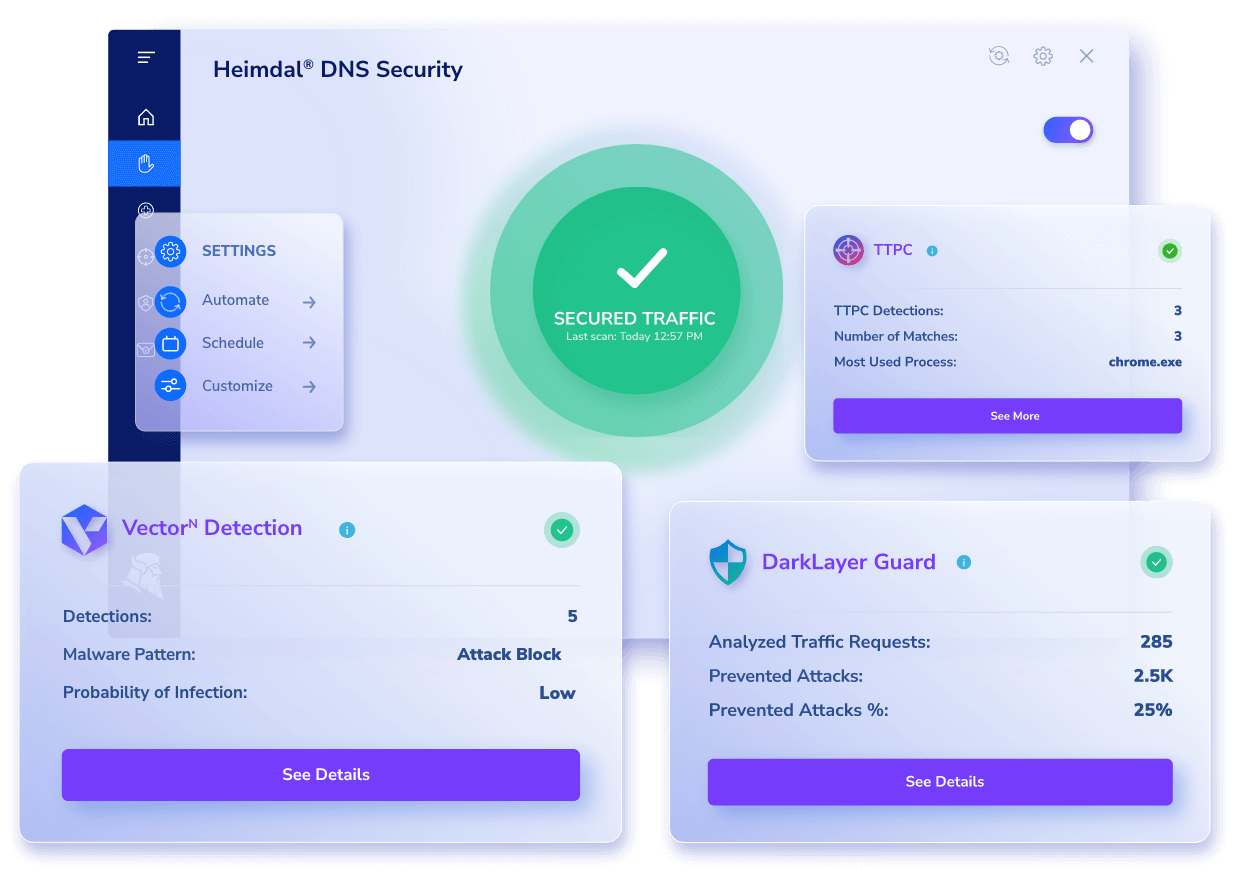
Heimdal® offers two DNS security solutions—DNS Security Endpoint and DNS Security Network—powered by AI, machine learning, and cybercrime intelligence to protect against emerging threats.
These tools scan traffic in real-time, blocking malicious domains and preventing hacker communication.
DNS Security Endpoint ensures safe browsing with minimal system impact.
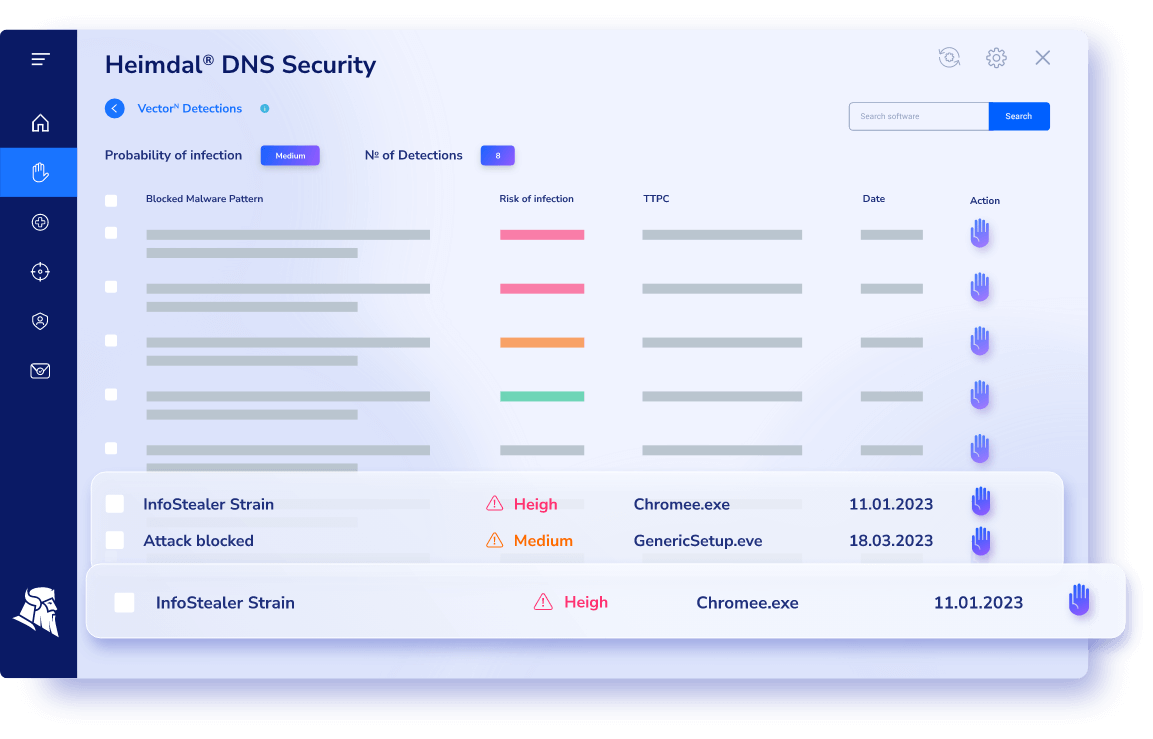
Key Features:
- Traffic Filtering: Blocks cyber threats at all levels, stopping attacks that bypass traditional antivirus.
- AI-Powered Prediction: Predictive DNSPat.Pend. tech forecasts threats with 96% accuracy for proactive protection.
- Threat Hunting: Detects malicious URLs, traces attackers, and ensures full endpoint visibility.
- DNS over HTTPS Filtering: First to offer true DNS over HTTPS for enhanced threat prevention.
- Advanced Malware Detection: Uses AI-driven threat intel for proactive security beyond traditional antivirus.
- Proactive Protection: Includes CASB to combat insider threats, shadow IT, and account compromises.
- Seamless Integration: Works with any security solution, providing cloud-native threat intelligence.
Pros:
- Blocks Threats: Prevents access to infected domains and hacker communication.
- AI-Powered Prediction: 96% accuracy in forecasting cyber threats.
- Advanced Threat Hunting: Full visibility and control over endpoints.
- DNS over HTTPS Filtering: Goes beyond standard protection.
- Seamless Integration: Enhances security with minimal system impact.
Cons:
- New users may require time to become familiar with the system.
- A reliable internet connection is required for effective performance.
Pricing:
Heimdal® offers customized pricing that fits your specific business requirements and usage patterns.
You can also book a demo to see Heimdal® in action before making any commitments.
For a complete, robust, and integrated cybersecurity solution, we suggest you also check out our Heimdal® XDR platform, which encompasses all our solutions into one to offer you the best protection for your company from a single dashboard, easy to manage and very effective overall.

Transform the way in which you do cybersecurity with our top-of-the-line solutions, which you can tailor based on the specific needs of your company!
2. Cisco Umbrella
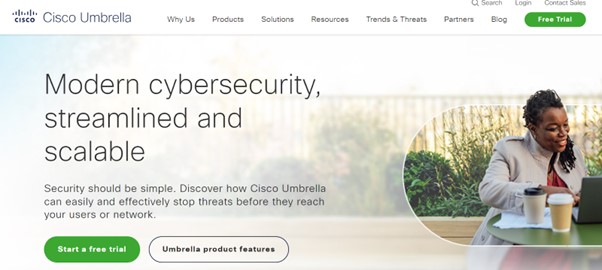
Cisco Umbrella is a cloud-based DNS security service that protects users and devices from cyberthreats. It uses Cisco Talos threat intelligence and DNSSEC to block attacks before they reach the network. Umbrella’s DNS-layer security can stop threats over all ports and protocols, and it can extend to every device connected to the network, including IoT.
Key Features:
- DNS-Layer Security: It stops threats at the earliest point, reducing infections and alerts from other security products.
- Web Security via Selective Proxy: It routes risky domain requests to a selective proxy for deeper URL and file inspection.
- App Discovery Report: It discovers and blocks shadow IT based on domains.
- Web Filtering: It enables web filtering using over 85 domain content categories.
- Custom Allow and Block Lists: It allows users to create custom allow and block lists.
Pros:
- Proxies requests to risky domains for deeper inspection, improving performance.
- Allows enforcement of different security and content filtering settings on a per-computer basis.
Cons:
- Can deny access to secure websites.
- May be harder to integrate with third-party products.
- Some users have reported issues with slow data loading, inaccessible dashboard data, and other problems.
Pricing:
It offers customized pricing.
We have had issues where the DNS does not resolve and it also has interfered with the VPN of some of our users. It has provided a good DNS resolution solution for a lot of the time but the times it doesn’t work or affects a system has cost us crucial lost time.
3. Palo Alto Networks DNS Security
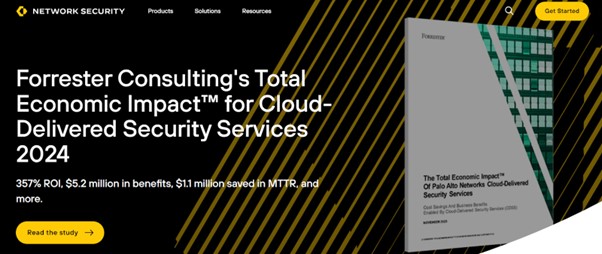
Palo Alto Networks DNS Security, a cloud-based service, safeguards networks from advanced threats via DNS. It employs machine learning and predictive analytics for real-time analysis of DNS requests and generates DNS signatures to thwart malware.
Additionally, it integrates with Palo Alto Networks next-generation firewalls to automate protection measures.
Key Features:
- Threat Coverage: Palo Alto Networks DNS Security boasts 40% more threat coverage compared to other vendors.
- Real-time DNS Analysis: The service performs real-time analysis of DNS responses.
- Automated Discovery and Monitoring: It automatically discovers and monitors public-facing domains.
- DNS Hijacking Protection: The service aids in preventing and halting network-based DNS hijacking attacks.
- Threat Intelligence: It offers access to a scalable threat intelligence system to maintain network protections up to date.
Pros:
- Provides detailed DNS traffic and botnet activity reports, enhancing visibility and monitoring capabilities.
- Delivers regular updates to DNS signatures, ensuring the latest protection against evolving threats.
Cons:
- Requires answering numerous questions for configuring complex countermeasures, often lacking all necessary parameters in a single window, which can complicate setup.
- The expense of the subscription for Palo Alto Networks DNS Security may be prohibitive for some organizations.
- Offers less flexibility in customization compared to highly customizable Linux systems, making it challenging to tailor configurations extensively.
Pricing:
Its pricing starts at $14,800.99 for a 3-year subscription license.
Although it provides the easiest and user-friendly web user interface, sometimes it asks too many questions to configure the complex countermeasures. Sometimes it does not give the required perimeters on the same window. We all know Linux is a highly customizable OS and we can customize in every manner so it’s hard to configure a guy to palo alto when any customization is required.
4. EasyDNS
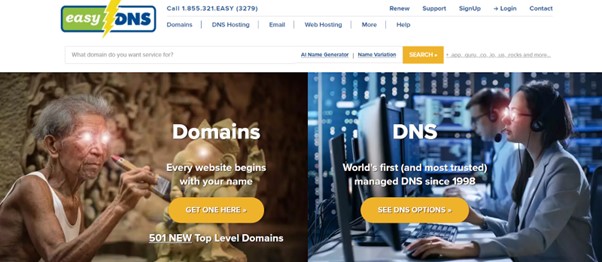
EasyDNS is a comprehensive DNS service provider that specializes in delivering secure, reliable, and efficient DNS management solutions. The company’s services encompass a wide range of features designed to ensure the seamless functioning of websites and online applications.
At its core, EasyDNS provides reliable DNS hosting with a 100% uptime guarantee, ensuring that websites remain accessible around the clock.
Key Features:
- Dynamic DNS (DDNS): It supports Dynamic DNS for users with changing IP addresses, making it ideal for remote access and home network setups.
- Secondary DNS: It provides secondary DNS services to enhance redundancy and reliability by serving as an additional DNS server for your domain.
- Advanced DNS Management: It includes a control panel for managing DNS records, such as A, AAAA, MX, CNAME, and TXT records, with ease.
- Monitoring and Alerts: It offers monitoring services and real-time alerts to notify you of any issues with your domain or DNS setup.
- DNS Analytics: It provides detailed DNS analytics and reporting to help you understand traffic patterns and optimize DNS performance.
Pros:
- Provides a DNS management interface for controlling Route53 Hosted Zones.
- Allows mixing and matching easyDNS nameservers with Route53 DNS.
- Separating DNS from hosting services helps avoid issues if the main hosting service fails.
Cons:
- May cut off DNS for domains with usage fees or those considered “Service Only” domains.
- Doesn’t register new domains or renew existing ones, risking domain expiry or being claimed by others.
Pricing:
It starts at $19.95/year.
Works as advertised. Pricey but not that pricey. No way to clear the queue if a disaster occurs over too long of a period of time. I had a backlog that didn’t really need to be delivered (stale data) that took days to clear. Eventually I had to block easyDNS from my mail servers until they expired in their queue.
5. DNSSense
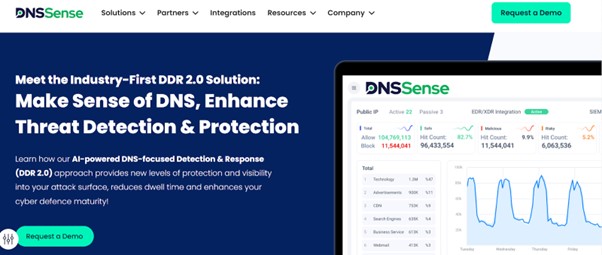
DNSSense is a cybersecurity firm specializing in advanced DNS security solutions to protect networks from a wide range of online threats. By leveraging sophisticated DNS technology, DNSSense provides organizations with a proactive approach to network security, enhancing both the safety and performance of their internet usage.
Their comprehensive suite of services is designed to offer in-depth protection, detailed analytics, and customizable policies to meet the unique needs of each business.
Key Features:
- Threat Intelligence: It utilizes real-time threat intelligence to identify and block malicious domains, protecting networks from phishing, malware, and other cyber threats.
- Content Filtering: It offers customizable content filtering options, allowing organizations to control and restrict access to specific types of websites based on categories or custom policies.
- DNS Firewall: It acts as a protective barrier, preventing access to harmful websites and stopping threats at the DNS level before they reach the network.
- Reporting and Analytics: It provides comprehensive reports and analytics on DNS queries, giving insights into network traffic and potential security threats.
- Policy Management: It enables administrators to create and enforce DNS policies tailored to the organization’s security needs, ensuring compliance and control over internet usage.
Pros:
- Utilizes real-time threat intelligence to detect and block malicious domains, enhancing network security.
- Offers customizable content filtering options, allowing precise control over internet usage.
Cons:
- Can be complex to integrate with existing third-party security systems.
- Some users have reported occasional issues with performance and latency.
- Requires ongoing management and updates to maintain optimal security levels.
Pricing:
It has not mentioned anything about its pricing, neither on its website nor on any other platform. So, we’re assuming that you need to book a demo to get their pricing info.
It uses AI to identify malicious/suspicious DNS and it is really fine tuned and useful for my taste. And it works with all devices, it just analyze the DNS querys. It can be litel tricky to learn and get comfortable in the UI, other than that there is no major problem that I can think of. Rarerly false-positive cases may occur.
6. DNSFilter
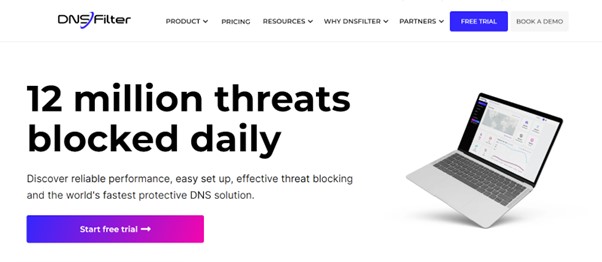
DNSFilter is a cloud-based DNS security solution that provides real-time threat protection, content filtering, and internet usage monitoring. It helps organizations safeguard their networks from malware, phishing, and other cyber threats while offering detailed analytics and reporting capabilities.
Key Features:
- Content filtering: It lets users select from a variety of filtering categories to block or allow domains.
- Unlimited block/allow list: With this, users can add an unlimited number of domains to their filtering policy’s block and allow lists.
- Security threat protection: DNSFilter protects against malware, phishing, and botnet attacks.
- Flexible deployment options: DNSFilter offers options for different types of organizations, including those that are fully remote, hybrid, or back in the office. These options include Active Directory integration and Roaming Clients for all operating systems.
Pros:
- Simple to install and configure without requiring additional hardware.
- Responsive support team that promptly addresses issues, often resolved with an override button.
Cons:
- Logs capture all activity, making it difficult to generate user-specific event reports.
- Can be overly strict at times, potentially blocking legitimate sites.
Pricing:
It starts at $0.90 per user per month.
We have deployed DNSFilter to hundreds of machines across dozens of clients. We’ve experienced a similar service failure on a handful of machines, with no clear indication as to why. And when the service fails…network activity grinds to a halt until you uninstall/reinstall. This is super painful when it happens to a VIP who is traveling or working remotely and their machine just got effectively bricked.
7. Cloudflare Application Security and Performance
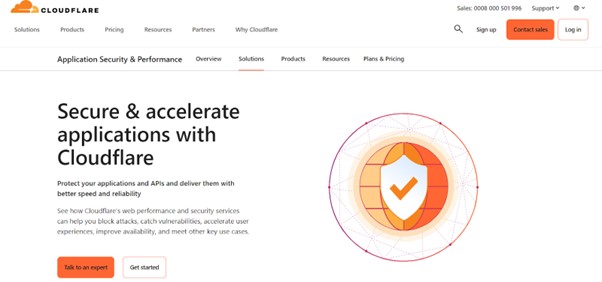
Cloudflare Application Security and Performance solutions provide comprehensive protection and optimization for websites and applications. Leveraging a vast global network, Cloudflare offers tools to enhance security, improve performance, and ensure the reliability of online services. Their integrated platform addresses the diverse needs of businesses by combining advanced security features with performance optimization techniques, ensuring a secure online experience for users.
Key Features:
- Web Application Firewall (WAF): It protects web applications from common threats and vulnerabilities such as SQL injection, cross-site scripting (XSS), and other OWASP top 10 attacks by filtering and monitoring HTTP traffic.
- DDoS Protection: It defends against distributed denial-of-service (DDoS) attacks by automatically detecting and mitigating large-scale attacks, ensuring website availability even under high traffic volumes.
- Content Delivery Network (CDN): It distributes content across a global network of servers, reducing latency and improving load times for users worldwide.
- Bot Management: It identifies and mitigates malicious bot traffic, protecting websites from scraping, credential stuffing, and other automated attacks while allowing legitimate bots to operate.
Pros:
- Integrates seamlessly with Terraform, making infrastructure automation easier.
- Changes deploy to the edge in seconds, enhancing responsiveness and efficiency.
Cons:
- The dashboard becomes busier and slower over time.
- Some features are complex and not user-friendly, especially for non-experts.
- Manual tuning and updates can be required, adding to maintenance efforts.
Pricing:
It starts at $20 per month (when billed annually).
When compared to other systems that are comparable to that cloud flare, the cost is typically higher; however, there are a few configuration and adaptability problems, particularly when we integrate that cloud flare system with other CRMs and other tracking systems. The other deliverability is also a bit slow; hopefully, that will be improved in the next version.
8. IBM NS1 Connect

IBM NS1 Connect is a robust networking solution designed to optimize network performance, reliability, and security. Leveraging advanced technologies, IBM NS1 Connect aims to streamline DNS management and enhance the overall efficiency of digital operations. It offers a suite of features tailored to meet the complex demands of modern enterprises, ensuring connectivity and resilience across global networks.
Key Features:
- Intelligent DNS Routing: It provides intelligent DNS resolution capabilities to optimize traffic routing and improve application performance based on real-time data and user-defined policies.
- Traffic Management: It offers sophisticated traffic management features, including load balancing and failover, to ensure high availability and reliability of applications and services.
- Security and Compliance: It implements robust security measures such as DDoS protection, DNSSEC, and threat intelligence integration to safeguard against cyber threats and ensure compliance with industry regulations.
- Global Server Load Balancing (GSLB): It facilitates optimal resource allocation and efficient traffic distribution across distributed data centers and cloud environments to maximize performance and user experience.
- Analytics and Insights: It provides comprehensive analytics and actionable insights into DNS traffic patterns, application performance metrics, and cybersecurity posture to facilitate informed decision-making and proactive network management.
Pros:
- Simplifies DNS management with automation and an API-first architecture, facilitating straightforward integration into development processes.
- Offers a favorable user experience with comprehensive features, tutorials, and responsive customer support to assist in effective platform utilization.
Cons:
- Lacks flexible pricing options compared to open-source or basic DNS management alternatives.
- Potential lock-in periods with NS1 Connect can complicate DNS configuration migrations.
- Some users noted limitations in real-time query insights and the absence of SSL certificate options, which are typically available in integrated hosting solutions.
Pricing:
It starts at $250 per access per month.
Even though NS1 shows queries almost in real-time, the shortfall is that it does not show the URLs that are being requested. If for instance, you see that queries to a website are not as expected perhaps they are too high indicating that there could be a cybersecurity problem you are not able to explore this further by seeing the URLs that are being requested. The other issue is that there is no option to add a Secure Sockets Layer (SSL) certificate.
DNS Security Explained
DNS security protects the Domain Name System (DNS) from cyberattacks, ensuring websites are accessible by translating domain names into IP addresses.
Think of DNS as the internet’s phone book, linking website names to their numerical addresses.
Here are the key components of DNS security:
- Redundant DNS Servers: Multiple servers ensure continuous service during failures or attacks.
- DNSSEC: Uses cryptographic signatures to authenticate DNS responses and prevent tampering.
- DNS Logging: Tracks queries and responses to detect and investigate suspicious activity.
To help you understand it even better, here’s how it works:
- Monitoring DNS Requests: Continuously tracking DNS activity helps detect threats like malware communicating with command-and-control servers.
- Security Policies: Enforcing strict policies, such as blocking malicious domains, enhances network protection.
- DNS-Layer Protection: Securing DNS servers prevents data breaches by blocking malicious queries and stopping malware communication.
- Interrupting Malicious Communication: DNS security disrupts hacker control over infected systems, preventing infrastructure compromise.
Why Do You Need DNS Security Software?
Now, the big question — do you even need it? If so, why?
Here’s your answer!
DNS security software is crucial for safeguarding your DNS infrastructure against a range of cyber threats. Without robust DNS security, cybercriminals can exploit vulnerabilities to:
- Redirect Users to Malicious Sites: Attackers can manipulate DNS queries to send users to fraudulent websites designed to steal personal information or install malware.
- Steal Sensitive Data: By intercepting DNS traffic, cybercriminals can capture confidential data, including login credentials and financial information.
- Hijack Websites: Hackers can take control of your domain and redirect your website’s traffic to their own servers, potentially causing significant harm to your business reputation and operations.
- Overload and Shut Down Servers: Cyberattacks, such as Distributed Denial of Service (DDoS) attacks, can flood your DNS servers with excessive requests, causing them to crash and disrupt your online services.
How to Choose the Best DNS Security Software for Your Business
As you’ve understood that having a DNS security system is a no-brainer — here’s how to choose the best one:
Speed and Reliability
- Fast Domain Name Resolution: The primary function of DNS security software is to translate domain names into IP addresses quickly and accurately. Look for software with a reputation for low latency and high uptime to ensure your users experience minimal delays.
- Redundancy and Failover Mechanisms: Ensure the software offers redundancy features to maintain service continuity in case of server failures. This includes multiple DNS servers and automatic failover capabilities.
Advanced Security Features
- DDoS Protection: Distributed Denial of Service (DDoS) attacks can cripple your DNS infrastructure by overwhelming it with traffic. Choose DNS security software with built-in DDoS protection to mitigate these threats and maintain service availability.
- Phishing Prevention: DNS security should include measures to block access to known phishing sites, protecting your users from fraud and data theft. Look for software that actively updates its threat database.
- Malware Blocking: Ensure the software can detect and block queries to malicious domains, preventing malware from communicating with its command-and-control servers. This helps contain infections and protect your network.
Integration Capabilities
- Compatibility with Other Network Tools: The best DNS security software should seamlessly integrate with your existing network management and security tools. This includes firewalls, intrusion detection systems (IDS), and security information and event management (SIEM) solutions.
- API Support: API support is essential for automating DNS management tasks and integrating DNS functions with other systems and applications. This enhances operational efficiency and enables more sophisticated network management.
Ease of Management
- User-Friendly Interface: A simple and intuitive interface can significantly reduce the time and effort required to manage your DNS settings. Look for software with a well-designed dashboard that provides clear visibility and control over your DNS infrastructure.
- Comprehensive Documentation and Support: Ensure the software comes with thorough documentation and access to support resources. Reliable customer support can be invaluable for troubleshooting and optimizing your DNS setup.
- Automated Updates and Patches: Choose DNS security software that offers automatic updates and security patches. This ensures your DNS infrastructure remains secure and up-to-date without requiring constant manual intervention.
Frequently Asked Questions (FAQs)
How to increase DNS speed?
Lowering the time-to-live (TTL) value for DNS records is the best way to speed up DNS propagation. This action instructs DNS resolvers to refresh the records more frequently, accelerating the propagation process.
What is the highest level of DNS?
The DNS root zone represents the topmost level in the DNS hierarchy tree. The root name server, which serves the root zone, responds to requests for records within the root zone and addresses other queries as well.
What is free DNS?
Free DNS is a complimentary service that provides DNS hosting for domain names, often used by individuals whose domain registrars do not include DNS hosting with domain registrations.










 Network Security
Network Security
 Vulnerability Management
Vulnerability Management
 Privileged Access Management
Privileged Access Management  Endpoint Security
Endpoint Security
 Threat Hunting
Threat Hunting
 Unified Endpoint Management
Unified Endpoint Management
 Email & Collaboration Security
Email & Collaboration Security










